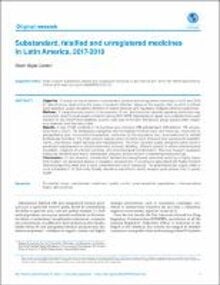[ABSTRACT]. Objective. Identify and analyze incidents of substandard, falsified, unregistered, and stolen medical products at the onset of the COVID-19 pandemic. Methods. Detailed search of the websites of regulatory authorities in the Americas. Identification of incidents of substandard, falsified, unregistered, and stolen medicines and medical devices (including in vitro diagnostics). The types of products were determined, as were the stages in the supply chain where they were detected, and the actions taken by authorities. Results. A total of 1 273 incidents were identified in 15 countries (1 087 substandard, 44 falsified, 123 unreg- istered, and 19 stolen products). The largest number of incidents involved medical devices, disinfectants, and antiseptics. The most frequently reported point in the supply chain was online purchasing. The principal measures taken by the regulatory authorities were: alerts, prohibition of use, prohibition of advertising and manufacture, recall, and monitoring of adverse events. Conclusions. A substantial number of incidents involving substandard, falsified, unregistered, and stolen medical products at the onset of the COVID-19 pandemic were identified. Shortages of supplies, easing of regulatory requirements, and increased demand are factors that may have led to an increase in the number of incidents. The national regulatory authorities of reference reported more frequent detection of incidents and more frequent application of health measures. A regulatory strategy is needed in order to address online sales and ensure the safe distribution of medical products. |

